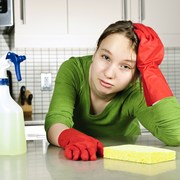 MonkeyBusiness Images/PhotoSpin
MonkeyBusiness Images/PhotoSpin
Most people are proud of their cleanliness and rightly so! A clean body, home and environment is never a bad thing.
But in the past couple of decades, we've seen a huge surge in a kind of extreme cleanliness that may be bad for our (and our children's) health.
We're told that our homes should be germ free. Commercials tell us that their cleaning products will remove up to 99 percent of any germs. They say that we should also sanitize our cars, work spaces and general environments so that we're living in a proverbial bubble -- free and clear of any germ possible.
But this recent mentality isn't necessarily a good thing. As well as losing all the bad germs, we're losing good germs -- the germs that build up our immune systems and the good bacteria that's actually beneficial to our health.
Our children are less hardy than they were, with their bodies and lives receiving a super-cleaning on a daily basis and leaving their bodies with less resistance to attacks from the bad stuff.
As reported on NBC News, researchers have found that too much sanitation is opening up a plethora of allergies that are invading our systems.
Using the term ""hygiene hypothesis", they found that too much hygiene can lead children to become allergic to things like pollen and animal dander.
The researchers looked at Amish children living on farms, exposed to bacteria (as well as drinking non-pasteurized milk and milk products) compared to non-Amish kids and found that they were less likely to have allergies.
Because their immune systems have had to learn to fight off microbes and "bad" bacteria, their systems were better able to deal with the likes of pet dander. They were also less likely to develop asthma.
In other words, these kids had stronger immune systems and were more hardy.
EmpowHER HerWriter alysiak reported that the publication Psychology Today is also very wary of our new culture of clean, from both a psychological standpoint, as well as the physical implications.
They said:
"Because we seem never to feel clean enough, all our scrubbing and scouring only stokes the anxiety it is meant to allay. But it may be sabotaging our physical health as well. Just as overprotecting children can keep them from developing coping skills, sanitizing ourselves may be undermining the immune system, which requires germs to keep it viable. What's more, overuse and misuse of cleaning products directly expose us to toxic chemicals. And, quite possibly, they even encourage what germophobes fear most—the rise of resistant 'superbugs'.
https://www.empowher.com/community/ask/are-we-too-hung-being-clean/
Fear of germs does indeed cause anxiety. It can cause cleaning compulsions and anxiety over the state of our bodies and minds.
Homes are filled with chemicals for cleaning that are extremely hazardous if accidentally consumed and many parents feel their environments are never clean enough for their families.
People need to bear in mind that our immune systems are made to be tested and this can actually strengthen our bodies.
Frequent hand-washing is very important to rid of germs that can cause flu and other infections or viruses.
Clean work spaces are important. So is proper food preparation as well as clean and organized refrigerators, pantries and other areas where food is stored.
Toilets and floors should be cleaned regularly as well as things we don't think much about like door handles, remote controls, phones and toys.
But we're not going to get sick if our homes and workplaces aren't sanitized. We don't need to bleach our environments into oblivion.
We need to remember that ridding ourselves of good bacteria (e.g., by overuse of antibiotics) and any germ we can think of, will ironically weaken our bodies and leave us open to more sicknesses and allergies.
Use common sense and relax a little!
SOURCES:
ABCNews.com. Vitals. "Is it possible to be too clean? Researchers say yes." By Linda Carroll. Web. Retrieved October 10th, 2012.
http://vitals.nbcnews.com/_news/2012/10/08/14301214-is-it-possible-to-be...?
EmpowHER.com. Wellness. "Are we too hung up on being clean?", by alisiak. Web. Retrieved October 10th, 2012.
https://www.empowher.com/community/ask/are-we-too-hung-being-clean
Reviewed October 11, 2012
by Michele Blacksberg RN
Edited by Jody Smith




Add a Comment3 Comments
It's not a culture, it's a cult...led by consumerism.
January 31, 2013 - 11:31pmThis Comment
Very well done I agree. It almost has become an obsession among us.
I am guilty of it as well coming from a very sterile environment like my dental office I expect my home to be same way and its almost impossible with two small kids and a dog.
Marielaina Perrone DDS
October 13, 2012 - 3:30pmHenderson Cosmetic Dentist
This Comment
Great article Susan! I've been saying for years that the reason there are so many ill children these days is because they are too sanitized. Us boomers shared garden hoses and soda bottles, played in the dirt, then ate something (when mom wasn't watching...LOL), we didn't always wash our hands, we weren't dragged to the doctor for antibiotics when we got a cold or fever - our moms treated us first and if after a day or two things didn't improve or were worse, then we went to the doctor, and still we were not immediately put on antibiotics. We didn't get sick often, kids with allergies was almost unheard of, in fact I didn't know of any. In all my youth I only knew 1 kid who had asthma - today it seems every kid has asthma or allergies. I truly believe it is a combination of too much sanitization, not to mention some of the chemicals in our foods. Kids cannot grow up to be healthy on all levels when they are kept in bubble.
Sorry for the ramble, I was just so glad to see I'm not the only one who thinks we have become "too clean".
October 11, 2012 - 9:09amThis Comment